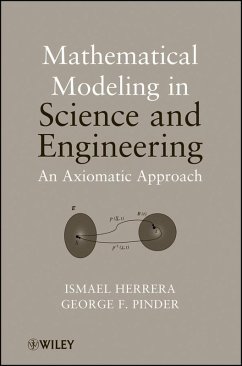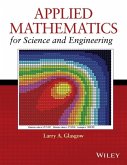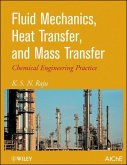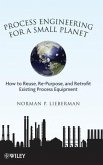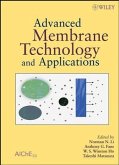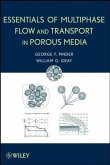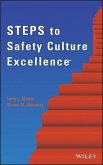Mathematical Modeling in Science and Engineering (eBook, PDF)
An Axiomatic Approach


Alle Infos zum eBook verschenken

Mathematical Modeling in Science and Engineering (eBook, PDF)
An Axiomatic Approach
- Format: PDF
- Merkliste
- Auf die Merkliste
- Bewerten Bewerten
- Teilen
- Produkt teilen
- Produkterinnerung
- Produkterinnerung

Hier können Sie sich einloggen

Bitte loggen Sie sich zunächst in Ihr Kundenkonto ein oder registrieren Sie sich bei bücher.de, um das eBook-Abo tolino select nutzen zu können.
A powerful, unified approach to mathematical and computational modeling in science and engineering Mathematical and computational modeling makes it possible to predict the behavior of a broad range of systems across a broad range of disciplines. This text guides students and professionals through the axiomatic approach, a powerful method that will enable them to easily master the principle types of mathematical and computational models used in engineering and science. Readers will discover that this axiomatic approach not only enables them to systematically construct effective models, it also…mehr
- Geräte: PC
- mit Kopierschutz
- eBook Hilfe
- Größe: 15.82MB
![Applied Mathematics for Science and Engineering (eBook, PDF) Applied Mathematics for Science and Engineering (eBook, PDF)]() Larry A. GlasgowApplied Mathematics for Science and Engineering (eBook, PDF)103,99 €
Larry A. GlasgowApplied Mathematics for Science and Engineering (eBook, PDF)103,99 €![Fluid Mechanics, Heat Transfer, and Mass Transfer (eBook, PDF) Fluid Mechanics, Heat Transfer, and Mass Transfer (eBook, PDF)]() K. S. RajuFluid Mechanics, Heat Transfer, and Mass Transfer (eBook, PDF)154,99 €
K. S. RajuFluid Mechanics, Heat Transfer, and Mass Transfer (eBook, PDF)154,99 €![Process Engineering for a Small Planet (eBook, PDF) Process Engineering for a Small Planet (eBook, PDF)]() Norman P. LiebermanProcess Engineering for a Small Planet (eBook, PDF)86,99 €
Norman P. LiebermanProcess Engineering for a Small Planet (eBook, PDF)86,99 €![Physical and Chemical Equilibrium for Chemical Engineers (eBook, PDF) Physical and Chemical Equilibrium for Chemical Engineers (eBook, PDF)]() Noel De NeversPhysical and Chemical Equilibrium for Chemical Engineers (eBook, PDF)126,99 €
Noel De NeversPhysical and Chemical Equilibrium for Chemical Engineers (eBook, PDF)126,99 €![Advanced Membrane Technology and Applications (eBook, PDF) Advanced Membrane Technology and Applications (eBook, PDF)]() Advanced Membrane Technology and Applications (eBook, PDF)181,99 €
Advanced Membrane Technology and Applications (eBook, PDF)181,99 €![Essentials of Multiphase Flow and Transport in Porous Media (eBook, PDF) Essentials of Multiphase Flow and Transport in Porous Media (eBook, PDF)]() George F. PinderEssentials of Multiphase Flow and Transport in Porous Media (eBook, PDF)131,99 €
George F. PinderEssentials of Multiphase Flow and Transport in Porous Media (eBook, PDF)131,99 €![Steps to Safety Culture Excellence (eBook, PDF) Steps to Safety Culture Excellence (eBook, PDF)]() Terry L. MathisSteps to Safety Culture Excellence (eBook, PDF)54,99 €
Terry L. MathisSteps to Safety Culture Excellence (eBook, PDF)54,99 €-
-
-
Dieser Download kann aus rechtlichen Gründen nur mit Rechnungsadresse in A, B, BG, CY, CZ, D, DK, EW, E, FIN, F, GR, HR, H, IRL, I, LT, L, LR, M, NL, PL, P, R, S, SLO, SK ausgeliefert werden.
- Produktdetails
- Verlag: John Wiley & Sons
- Seitenzahl: 264
- Erscheinungstermin: 19. März 2012
- Englisch
- ISBN-13: 9781118207208
- Artikelnr.: 38238180
- Verlag: John Wiley & Sons
- Seitenzahl: 264
- Erscheinungstermin: 19. März 2012
- Englisch
- ISBN-13: 9781118207208
- Artikelnr.: 38238180
Microscopic and macroscopic physics 2 1.3 Kinematics of continuous systems
3 1.3.1 Intensive properties 6 1.3.2 Extensive properties 8 1.4 Balance
equations of extensive and intensive properties 9 1.4.1 Global balance
equations 9 1.4.2 The local balance equations 10 1.4.3 The role of balance
conditions in the modeling of continuous systems 13 1.4.4 Formulation of
motion restrictions by means of balance equations 14 1.5 Summary 16 2
MECHANICS OF CLASSICAL CONTINUOUS SYSTEMS 23 2.1 One-phase systems 23 2.2
The basic mathematical model of one-phase systems 24 2.3 The
extensive/intensive properties of classical mechanics 25 2.4 Mass
conservation 26 2.5 Linear momentum balance 27 2.6 Angular momentum balance
29 2.7 Energy concepts 32 2.8 The balance of kinetic energy 33 2.9 The
balance of internal energy 34 2.10 Heat equivalent of mechanical work 35
2.11 Summary of basic equations for solid and fluid mechanics 35 2.12 Some
basic concepts of thermodynamics 36 2.12.1 Heat transport 36 2.13 Summary
38 3 MECHANICS OF NON-CLASSICAL CONTINUOUS SYSTEMS 45 3.1 Multiphase
systems 45 3.2 The basic mathematical model of multiphase systems 46 3.3
Solute transport in a free fluid 47 3.4 Transport by fluids in porous media
49 3.5 Flow of fluids through porous media 51 3.6 Petroleum reservoirs: the
black-oil model 52 3.6.1 Assumptions of the black-oil model 53 3.6.2
Notation 53 3.6.3 Family of extensive properties 54 3.6.4 Differential
equations and jump conditions 55 3.7 Summary 57 4 SOLUTE TRANSPORT BY A
FREE FLUID 63 4.1 The general equation of solute transport by a free fluid
64 4.2 Transport processes 65 4.2.1 Advection 65 4.2.2 Diffusion processes
65 4.3 Mass generation processes 66 4.4 Differential equations of diffusive
transport 67 4.5 Well-posed problems for diffusive transport 69 4.5.1
Time-dependent problems 70 4.5.2 Steady state 71 4.6 First-order
irreversible processes 71 4.7 Differential equations of non-diffusive
transport 73 4.8 Well-posed problems for non-diffusive transport 73 4.8.1
Well-posed problems in one spatial dimension 74 4.8.2 Well-posed problems
in several spatial dimensions 79 4.8.3 Well-posed problems for steady-state
models 80 4.9 Summary 80 5 FLOW OF A FLUID IN A POROUS MEDIUM 85 5.1 Basic
assumptions of the flow model 85 5.2 The basic model for the flow of a
fluid through a porous medium 86 5.3 Modeling the elasticity and
compressibility 87 5.3.1 Fluid compressibility 87 5.3.2 Pore
compressibility 88 5.3.3 The storage coefficient 90 5.4 Darcy's law 90 5.5
Piezometric level 92 5.6 General equation governing flow through a porous
medium 94 5.6.1 Special forms of the governing differential equation 95 5.7
Applications of the jump conditions 96 5.8 Well-posed problems 96 5.8.1
Steady-state models 97 5.8.2 Time-dependent problems 99 5.9 Models with a
reduced number of spatial dimensions 99 5.9.1 Theoretical derivation of a
2-D model for a confined aquifer 100 5.9.2 Leaky aquitard method 102 5.9.3
The integrodifferential equations approach 104 5.9.4 Other 2-D aquifer
models 108 5.10 Summary 111 6 SOLUTE TRANSPORT IN A POROUS MEDIUM 117 6.1
Transport processes 118 6.1.1 Advection 118 6.2 Non-conservative processes
118 6.2.1 First-order irreversible processes 119 6.2.2 Adsorption 119 6.3
Dispersion-diffusion 121 6.4 The equations for transport of solutes in
porous media 123 6.5 Well-posed problems 125 6.6 Summary 125 7 MULTIPHASE
SYSTEMS 129 7.1 Basic model for the flow of multiple-species transport in a
multiple-fluid- phase porous medium 129 7.2 Modeling the transport of
species i in phase a 130 7.3 The saturated flow case 133 7.4 The air-water
system 137 7.5 The immobile air unsaturated flow model 142 7.6 Boundary
conditions 143 7.7 Summary 145 8 ENHANCED OIL RECOVERY 149 8.1 Background
on oil production and reservoir modeling 149 8.2 Processes to be modeled
151 8.3 Unified formulation of EOR models 151 8.4 The black-oil model 152
8.5 The Compositional Model 156 8.6 Summary 160 9 LINEAR ELASTICITY 165 9.1
Introduction 165 9.2 Elastic Solids 166 9.3 The Linear Elastic Solid 167
9.4 More on the Displacement Field Decomposition 170 9.5 Strain Analysis
171 9.6 Stress Analysis 173 9.7 Isotropic materials 175 9.8 Stress-strain
relations for isotropic materials 177 9.9 The governing differential
equations 179 9.9.1 Elastodynamics 180 9.9.2 Elastostatics 180 9.10
Well-posed problems 181 9.10.1 Elastostatics 181 9.10.2 Elastodynamics 181
9.11 Representation of solutions for isotropic elastic solids 182 9.12
Summary 183 10 FLUID MECHANICS 189 10.1 Introduction 189 10.2 Newtonian
fluids: Stokes' constitutive equations 190 10.3 Navier-Stokes equations 192
10.4 Complementary constitutive equations 193 10.5 The concepts of
incompressible and inviscid fluids 193 10.6 Incompressible fluids 194 10.7
Initial and boundary conditions 195 10.8 Viscous incompressible fluids:
steady states 196 10.9 Linearized theory of incompressible fluids 196 10.10
Ideal fluids 197 10.11 Irrotational flows 198 10.12 Extension of
Bernoulli's relations to compressible fluids 199 10.13 Shallow-water theory
200 10.14 Inviscid compressible fluids 202 10.14.1 Small perturbations in a
compressible fluid: the theory of sound 203 10.14.2 Initiation of motion
204 10.14.3 Discontinuous models and shock conditions 206 10.15 Summary 208
A: PARTIAL DIFFERENTIAL EQUATIONS 211 A. 1 Classification 211 A.2 Canonical
forms 213 A.3 Well-posed problems 213 A.3.1 Boundary-value problems: the
elliptic case 214 A.3.2 Initial-boundary-value problems 214 B: SOME RESULTS
FROM THE CALCULUS 217 B.l Notation 217 B.2 Generalized Gauss Theorem 218 C:
PROOF OF THEOREM 221 D: THE BOUNDARY LAYER INCOMPRESSIBILITY APPROXIMATION
225 E: INDICIAL NOTATION 229 E.l General 229 E.2 Matrix algebra 230 E.3
Applications to differential calculus 232 Index 235
Microscopic and macroscopic physics 2 1.3 Kinematics of continuous systems
3 1.3.1 Intensive properties 6 1.3.2 Extensive properties 8 1.4 Balance
equations of extensive and intensive properties 9 1.4.1 Global balance
equations 9 1.4.2 The local balance equations 10 1.4.3 The role of balance
conditions in the modeling of continuous systems 13 1.4.4 Formulation of
motion restrictions by means of balance equations 14 1.5 Summary 16 2
MECHANICS OF CLASSICAL CONTINUOUS SYSTEMS 23 2.1 One-phase systems 23 2.2
The basic mathematical model of one-phase systems 24 2.3 The
extensive/intensive properties of classical mechanics 25 2.4 Mass
conservation 26 2.5 Linear momentum balance 27 2.6 Angular momentum balance
29 2.7 Energy concepts 32 2.8 The balance of kinetic energy 33 2.9 The
balance of internal energy 34 2.10 Heat equivalent of mechanical work 35
2.11 Summary of basic equations for solid and fluid mechanics 35 2.12 Some
basic concepts of thermodynamics 36 2.12.1 Heat transport 36 2.13 Summary
38 3 MECHANICS OF NON-CLASSICAL CONTINUOUS SYSTEMS 45 3.1 Multiphase
systems 45 3.2 The basic mathematical model of multiphase systems 46 3.3
Solute transport in a free fluid 47 3.4 Transport by fluids in porous media
49 3.5 Flow of fluids through porous media 51 3.6 Petroleum reservoirs: the
black-oil model 52 3.6.1 Assumptions of the black-oil model 53 3.6.2
Notation 53 3.6.3 Family of extensive properties 54 3.6.4 Differential
equations and jump conditions 55 3.7 Summary 57 4 SOLUTE TRANSPORT BY A
FREE FLUID 63 4.1 The general equation of solute transport by a free fluid
64 4.2 Transport processes 65 4.2.1 Advection 65 4.2.2 Diffusion processes
65 4.3 Mass generation processes 66 4.4 Differential equations of diffusive
transport 67 4.5 Well-posed problems for diffusive transport 69 4.5.1
Time-dependent problems 70 4.5.2 Steady state 71 4.6 First-order
irreversible processes 71 4.7 Differential equations of non-diffusive
transport 73 4.8 Well-posed problems for non-diffusive transport 73 4.8.1
Well-posed problems in one spatial dimension 74 4.8.2 Well-posed problems
in several spatial dimensions 79 4.8.3 Well-posed problems for steady-state
models 80 4.9 Summary 80 5 FLOW OF A FLUID IN A POROUS MEDIUM 85 5.1 Basic
assumptions of the flow model 85 5.2 The basic model for the flow of a
fluid through a porous medium 86 5.3 Modeling the elasticity and
compressibility 87 5.3.1 Fluid compressibility 87 5.3.2 Pore
compressibility 88 5.3.3 The storage coefficient 90 5.4 Darcy's law 90 5.5
Piezometric level 92 5.6 General equation governing flow through a porous
medium 94 5.6.1 Special forms of the governing differential equation 95 5.7
Applications of the jump conditions 96 5.8 Well-posed problems 96 5.8.1
Steady-state models 97 5.8.2 Time-dependent problems 99 5.9 Models with a
reduced number of spatial dimensions 99 5.9.1 Theoretical derivation of a
2-D model for a confined aquifer 100 5.9.2 Leaky aquitard method 102 5.9.3
The integrodifferential equations approach 104 5.9.4 Other 2-D aquifer
models 108 5.10 Summary 111 6 SOLUTE TRANSPORT IN A POROUS MEDIUM 117 6.1
Transport processes 118 6.1.1 Advection 118 6.2 Non-conservative processes
118 6.2.1 First-order irreversible processes 119 6.2.2 Adsorption 119 6.3
Dispersion-diffusion 121 6.4 The equations for transport of solutes in
porous media 123 6.5 Well-posed problems 125 6.6 Summary 125 7 MULTIPHASE
SYSTEMS 129 7.1 Basic model for the flow of multiple-species transport in a
multiple-fluid- phase porous medium 129 7.2 Modeling the transport of
species i in phase a 130 7.3 The saturated flow case 133 7.4 The air-water
system 137 7.5 The immobile air unsaturated flow model 142 7.6 Boundary
conditions 143 7.7 Summary 145 8 ENHANCED OIL RECOVERY 149 8.1 Background
on oil production and reservoir modeling 149 8.2 Processes to be modeled
151 8.3 Unified formulation of EOR models 151 8.4 The black-oil model 152
8.5 The Compositional Model 156 8.6 Summary 160 9 LINEAR ELASTICITY 165 9.1
Introduction 165 9.2 Elastic Solids 166 9.3 The Linear Elastic Solid 167
9.4 More on the Displacement Field Decomposition 170 9.5 Strain Analysis
171 9.6 Stress Analysis 173 9.7 Isotropic materials 175 9.8 Stress-strain
relations for isotropic materials 177 9.9 The governing differential
equations 179 9.9.1 Elastodynamics 180 9.9.2 Elastostatics 180 9.10
Well-posed problems 181 9.10.1 Elastostatics 181 9.10.2 Elastodynamics 181
9.11 Representation of solutions for isotropic elastic solids 182 9.12
Summary 183 10 FLUID MECHANICS 189 10.1 Introduction 189 10.2 Newtonian
fluids: Stokes' constitutive equations 190 10.3 Navier-Stokes equations 192
10.4 Complementary constitutive equations 193 10.5 The concepts of
incompressible and inviscid fluids 193 10.6 Incompressible fluids 194 10.7
Initial and boundary conditions 195 10.8 Viscous incompressible fluids:
steady states 196 10.9 Linearized theory of incompressible fluids 196 10.10
Ideal fluids 197 10.11 Irrotational flows 198 10.12 Extension of
Bernoulli's relations to compressible fluids 199 10.13 Shallow-water theory
200 10.14 Inviscid compressible fluids 202 10.14.1 Small perturbations in a
compressible fluid: the theory of sound 203 10.14.2 Initiation of motion
204 10.14.3 Discontinuous models and shock conditions 206 10.15 Summary 208
A: PARTIAL DIFFERENTIAL EQUATIONS 211 A. 1 Classification 211 A.2 Canonical
forms 213 A.3 Well-posed problems 213 A.3.1 Boundary-value problems: the
elliptic case 214 A.3.2 Initial-boundary-value problems 214 B: SOME RESULTS
FROM THE CALCULUS 217 B.l Notation 217 B.2 Generalized Gauss Theorem 218 C:
PROOF OF THEOREM 221 D: THE BOUNDARY LAYER INCOMPRESSIBILITY APPROXIMATION
225 E: INDICIAL NOTATION 229 E.l General 229 E.2 Matrix algebra 230 E.3
Applications to differential calculus 232 Index 235
